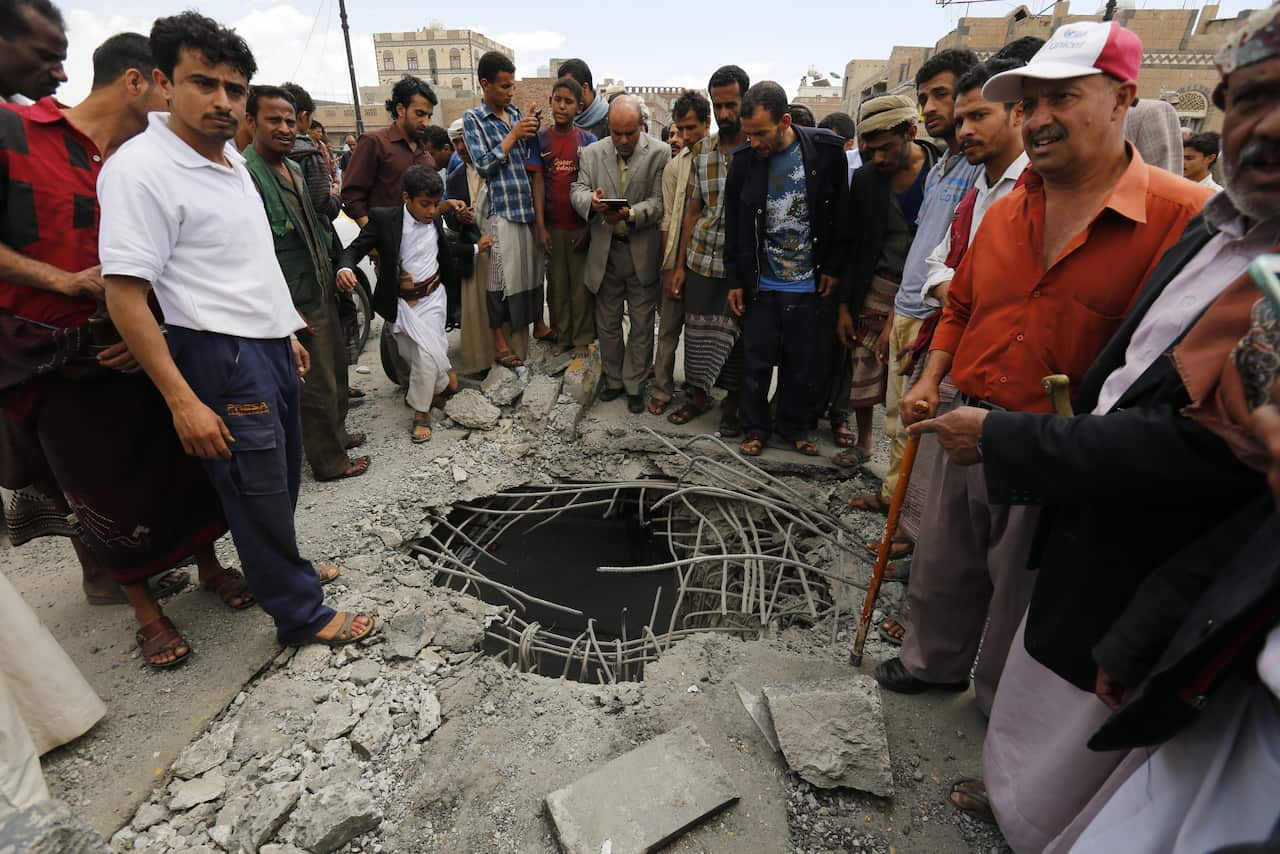The year-long forgotten war in Yemen has killed more than 6,000 people according to the United Nations, including nearly 2,000 civilians reportedly killed by Saudi Arabian-led air strikes.
Last week, a Saudi air attack killed 41 civilians and wounded 75 others in the country's north-west.
UN special envoy Ismail Ould Cheik Ahmed says a ceasefire will take hold next month.
Medicins Sans Frontieres nurse Suzel Wieget has recently returned from working in Ibb, close to the besieged town of Taiz.

Yemenis inspect damages made by a Saudi-led airstrike on a bridge, two people were killed and three injured, Sana'a, Yemen, 23 March 2016. Source: AAP
"We were supporting the emergency department in the Al Thawra hospital," she told SBS.
"It's a 31-bed emergency department, but there was very little organisation, so we implemented a triage system, we implemented a registration system, because there are so many people coming to Ibb now we were seeing around 800 presentations a week," she said.
Yemen descended into civil war last year over a fight for power between Zaidi Shia rebels, known as Houthis, and forces loyal to now ousted president Abdrabbuh Mansour Hadi.
Mr Hadi fled to Saudi Arabia, requesting the country to intervene and launch air strikes on Houthi targets.
A spokesman for the UN refugee agency UNHCR, Rupert Colville, has said the strikes by a Saudi-led coalition have caused twice as many civilians casualties as all other forces together.
"These awful incidents continue to occur with unacceptable regularity, and, in addition, despite public promises to investigate such incidents, we have yet to see progress in any such investigations," he said.
"It would appear to be the case of the distinction between legitimate military targets and civilian ones, which are protected under international law, is, at best, woefully inadequate. And, at worst, we are looking, possibly looking, at the commission of international crimes by members of the coalition."
Related reading

Saudi-led coalition ending Yemen ceasefire
The United States and Britain continue to supply Saudi Arabia with arms, despite mounting questions over whether its forces are breaching international human-rights law.
The European Union and the Dutch parliament are calling for a European Union arms embargo.
And Amnesty International is asking all states to stop the direct and indirect supply of arms and financial aid.
The deputy director for Amnesty International's Middle East program, James Lynch, told SBS Saudi Arabia's international partners are "fueling the fire".
He says he is skeptical whether recent peace talks will improve the situation for Yemeni civilians.
"By arming the coalition, it appears to show that these two states you know, Saudi Arabia's key strategic allies are giving the green light for the way in which this military campaign is being carried out, which has been characterised by reckless strikes and disregard for civilian life," he says.
"There are some efforts going to progress peace talks. The picture's not at all clear. On the ground, the situation is not changing. Yemeni people are not feeling any change to their situation." Amnesty International says both sides of the conflict are to blame for indiscriminate attacks and human-rights abuses against civilians, including at hospitals.
Amnesty International says both sides of the conflict are to blame for indiscriminate attacks and human-rights abuses against civilians, including at hospitals.

Yemeni tribesmen supporting forces loyal to Yemen's President Abedrabbo Mansour Hadi, hold position during clashes with Huthi rebels in city of Taez. Source: Getty Images
Ms Wieget told SBS it appears international law is not being respected and she felt constantly under threat while she was there.
"We had an instance where we were in a resuscitation room, looking after very severely burned patients. There was an accidental explosion in the market, and three or four people were bought in our reanimation room, and there was a security incident and we had to leave," she says.
"There were still national doctors looking after them, but, as expats, we had to leave for a while, then come back when the security incident was over. That's also a very hard thing for a medical person to do when we have to try to do the best we can with what we have."
The UN says the ceasefire will take hold at midnight on April 10, and peace talks will take place in Kuwait a week later.
Share

